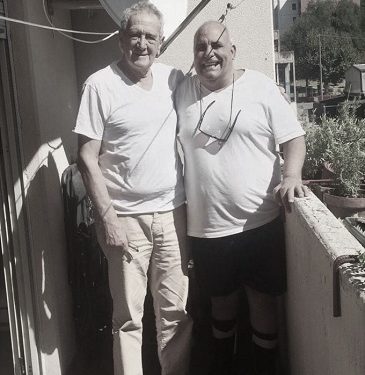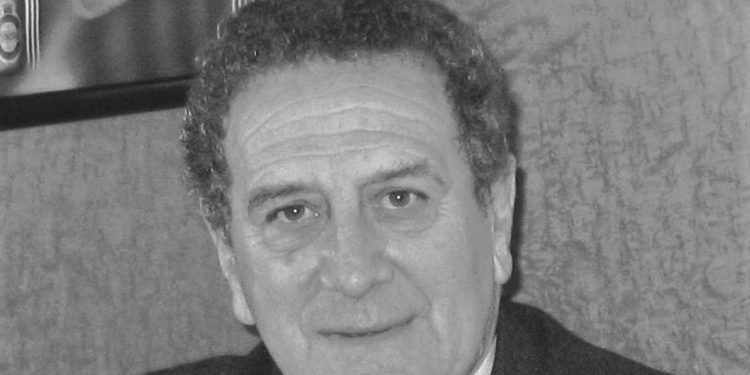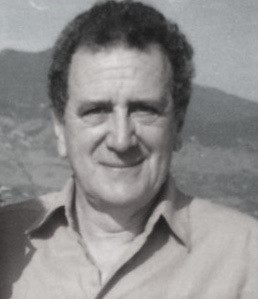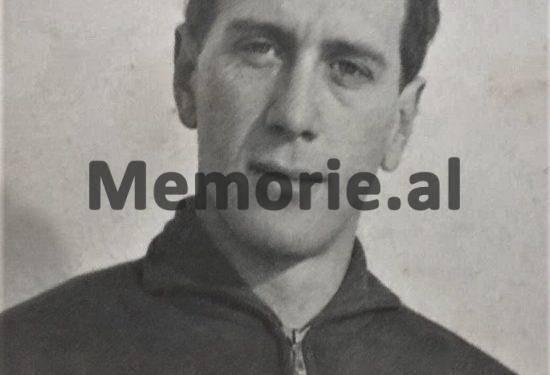By Filip Guraziu
The tenth part
Memorie.al / Valentino Cuccu, originally from Sardinia, we lived in Trieste, he is my first friend, whom I met in Italy, in July 1991. He was loving, hospitable, kind, self-sacrificing and “by irony of fate”, communist! But this didn’t stop us; he became friends with me and has kept his friendship with me until today, after 30 years. He accepted my invitation to visit Albania with pleasure. In the first days of September 1991, Valentino came in his car, by road, where he found welcome in my family. After those years of isolation from the world, in 1991, the arrival of an Italian in Shkodër was an event, so from friends and cousins, we had invitations for visits, lunches, dinners and weddings.
Velipoja, October 1, 1991
Wherever we went, in my family or social circle, Valentino was confronted with chilling facts of suffering from the “class war”, which made a great impression on him. An idealistic communist, of the European type, like Valentino, never imagined that there is a type of criminal mafia communism, like that, of Albanian communism. Confronting evil shook him spiritually. When he returned to Italy, he declared to me that he no longer felt himself a communist!
The day, October 1, 1991, turned out to be exceptionally beautiful and hot. We decided to go with Valentino to Velipoja, for a walk, but we also took bathing suits.
My close friend Beniamin Deda (Beni) also came with us. The beach of Velipoja, that day, seemed more beautiful than ever, because it was all ours, no one was there. The sea had waves, but nothing special, we put on our bathing suits and all, quickly, towards the sea. Since Erina (the girl) was 9 years old, I didn’t think it was reasonable to leave her alone on the beach, so I told the others: you go, because I’m staying with the girl.
I sat by the sea, Erina started playing with me in the water. After a while, as if unintentionally, my eyes went to the “group of swimmers”, who were leaving quite quickly, from the shore, and for a moment I wondered how they were swimming so fast! I knew that Ben was not a good swimmer. What was going on, then? I didn’t have time to think any longer, because a shout was heard from the sea: ‘Aiuto, aiuto’ – and someone from the group gave me a signal, to play both hands. I imagined the tragic situation. I came to Erina and shouted to her sternly: Don’t you dare to go to sea alone! Well, neither one, nor two, but I rushed to the sea.
At that time, at the age of 48, the energies of a former athlete had not yet run out. I quickly crawled towards the group and when I arrived, I found Ben almost drowned, unable to speak but still conscious. I shouted to him, bring him on his back and don’t play with his hands or feet, but put his feet together (I knew that he stood very well on the water, in the position with his back towards the sea). I pushed it, with my legs together towards the shore and then as much power as possible in the push, I swam frog style, with a dive.
Ben drank water during the pushing, but it didn’t really matter, because we got close to the shore and I arrived with my feet on the ground, then I took him in my arms and pulled him out of the sea. As soon as he lay down on the bed, he began to vomit; I knew that Ben was saved. But, I didn’t get to be happy enough, because at that moment the Italian, Valentino, started shouting: ‘Aiuto, aiuto’.
I repeated the action a second time as with Ben; I found Valentino somewhat easier than Ben, but he no longer had the strength to stay on the water (he also suffered from an illness that had started to numb his muscles). Then I said to him: Lean on my neck, I only play with my legs. Frog-style again, diving, we both approached the shore. As soon as I put my feet on the ground, I took her in my arms and pulled her out of the sea.
At the moment, when I let Valentino into the water, Livia (the older girl, at that time, 14 years old) came out of the sea and very excitedly told me that my mother couldn’t swim to the shore, that’s why she had to help. For the third time I rushed towards the sea, crawling, I reached Justi, who was swimming very well and was quite calm, but she told me that, although she was swimming with all her strength, the water of the sea was pushing her away from the shore. .!
I instructed him to play only with his hands, frog-style, and to keep his feet together. We did the same as in Ben’s case, but easier, because Justi stayed on the water and helped with the movement of the arms, I pushed her legs with force, swam frog style, diving.
God gave me strength, I didn’t feel tired, and maybe even the emotion of the situation strained me to the max. We swam together with Justin until we met our feet, then we went normally, to the shore.
I remember that we stayed for a few minutes, without speaking, just lying on the ground; the emotion did not allow us to think about anything…! Then a hysterical burst of laughter covered us. The worst is over, “carpe diem”, we’re back home safe and sound.
Until that day, it hadn’t occurred to me and you didn’t have a day that in special conditions of the sea, in Velipoja, the current of water under the surface takes direction, you left the shore. Of the group, only Livia got out easily, because Livia was swimming, close to the surface of the water, so she avoided the current under the surface, which would push her away from the shore.
Some time ago, the fishermen of Velipoja explained to me that the phenomenon that happened to us that day was frequent in Velipoja, especially in autumn, and that most of those who drowned in Velipoja were drowned by the current under the surface that took them away from the shore!
The prelude to the very collapse of the Enverist dictatorship
The economic crisis of the world communist system, at the end of the 80s, reached alarming levels. Not only in Albania, but also in the countries of the communist “Block”, the situation was on the verge of mass starvation, a situation that heralded the most violent form of popular protests. Aware of the situation, the leaders of the communist dictatorial regimes were forced to accept the need to change the system and to open up to Western democracies.
Popular anti-communist movements in Poland were not suppressed by repression, and the same happened in the case of the destruction of the wire mesh fence that separated Hungary’s border with Austria, from where thousands of Hungarians fled to the free world.
Although the Albanian economy was viable (I remember the unheard-of practice of paying 80% of the monthly salary to unemployed workers…but let them stay at home!), Albanian communism did not give concrete and visible signs of opportunities for change. Popular discontent and talks against the communist regime increased excessively, and in our interior, we had begun to understand that something could change…?!
At that time, we had bought a television and followed the news of the outside world through Yugoslav television, whose waves we could catch freely in Shkodër. The psychological state of my family, as in the families of relatives and friends, was very emotional; what we had hoped for all our lives were happening, the collapse of the communist system.
I remember that on that cold afternoon of November 9, 1989, the room was not so hot, and to follow the fall of the Berlin wall on television, which was broadcast live, we helped Father Emidio (Emidio Tedeschini, my father-in-law, an intellectual with a doctorate in Jurisprudence in Munich), since at that time, he was very tired of his health, so he sat on the armchair, near the television, with a blanket on his arms.
During the footage, Father Emidio broke down in tears, and so moved he said: “Blessed are you, who have seen the end of communism”. We were somewhat surprised, because here in Albania, there was no visible sign that the dictatorship was ending, however, we did not oppose it, but were pleased by its prophethood.
After a few days, a friend of mine, Gjergj Marena, hosted a dinner at his house, where I, Zefi (the wife’s brother) and six others, all his close friends, were present. That night, we celebrated together, the fall of the Berlin Wall. The two months that passed went by so quickly with comments and conversations about the new things that was happening, that we could no longer count the time and…! November 24, 1989 came!
That day, Yugoslav television broadcast live the revolt of the Romanian people, against the communist dictatorship of Nicolae Ceausescu, which electrified us. The next day, November 25, the Sunday of Easter, while waiting for the postmortem visits at home, on the occasion of the change of life of the father-in-law, (Emidio Tedeschini), we heard the news about the execution, in Romania, of the Ceausescu couple ( mother and wife), which fueled our fantasy about the collapse of the dictatorship in Albania as well.
The murder of the Romanian communist dictator, with his wife, was the talk of the day in Shkodër, and one can imagine how great the shock must have been for the criminals of the Political Bureau in Albania. The urgent meeting of the Political Bureau, to analyze the situation, under the chairmanship of Ramiz Ali, came out with a “very important” statement: “To stay close to the Albanian people, the Political Bureau of the Labor Party allowed every peasant family, to keep, for family needs, a goat or a sheep, or a pig”…!!!
This was the first concession of the communists, in favor of a hungry people! No comment!
We lived with “ears up”, to catch any kind of news, on the expected change of the regime’s political course. In the second week of January, rumors began to circulate that a group of young people from Shkodra had organized to tear down the Stalin monument, which was located in the central square of Shkodra (today “Mother Teresa” Square), and that, on the day of Sunday, January 14, 1990, at 12:00, the people of Shkodra were invited to gather in front of the monument.
We, the people of Shkodër who had experienced the violence of the communist dictatorship, these news seemed like a “fairytale about a king”, however, on Sunday around 11:30, together with Zef (brother-in-law), who had come from Durrës, we went to square. There we found out that the night before, the State Security had arrested all the organizers of the revolt for the demolition of the monument. The central square, where the Stalin monument was located, was full of State Security agents, in civilian clothes.
Many people, like our work, who had come out as spectators and did not have the courage to stand in the square in front of the monument, “bajshin jiro”, from Çobej Street (Kino-Vorere), to Rruga e Fretenve. An eerie calm dominated the atmosphere. I remember that, three young women; Huana Kurti, Keti Koçi and the late Laura Keçi, with their families, had approached the monument where Huana, with extraordinary (for the time) courage, encouraged the 4-year-old child, holding up two fingers, in the shape of a ‘V’!
After a while, the “artificial” calm was interrupted, by the sound of a stone, which hit the Sigurimi van, parked near the monument, someone on a bicycle, had expressed his hatred, you shot him with a stone, an action that was followed by a movement immediate, of the agents, in civilian clothes, who quickly apprehended the “Enemy of Power”.
After this scene, little by little, people started to disperse.
That day, in the afternoon, many boys and girls were questioned by the interrogator, suspected of collaboration, in the attempt to bring down the monument to Stalin (among them was Meri Beni, my cousin). Many were taken to the special investigator, in Tirana, and of them, about 16 people were tortured and sentenced to 12 years in prison; three were sent to an insane asylum (Psychiatric Hospital) and one of them, Rin Monajka, from torture, after he was released from prison, in a serious state of health, died two years later, in Austria.
After a few months, the communist government quietly removed the Stalin monument at night, under the pretext that they were supposedly renovating the square…! With the amnesty that the communist regime established on September 23, 1991, all political prisoners were released from prison. Memorie.al















